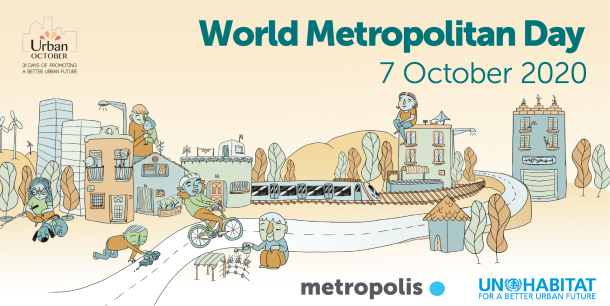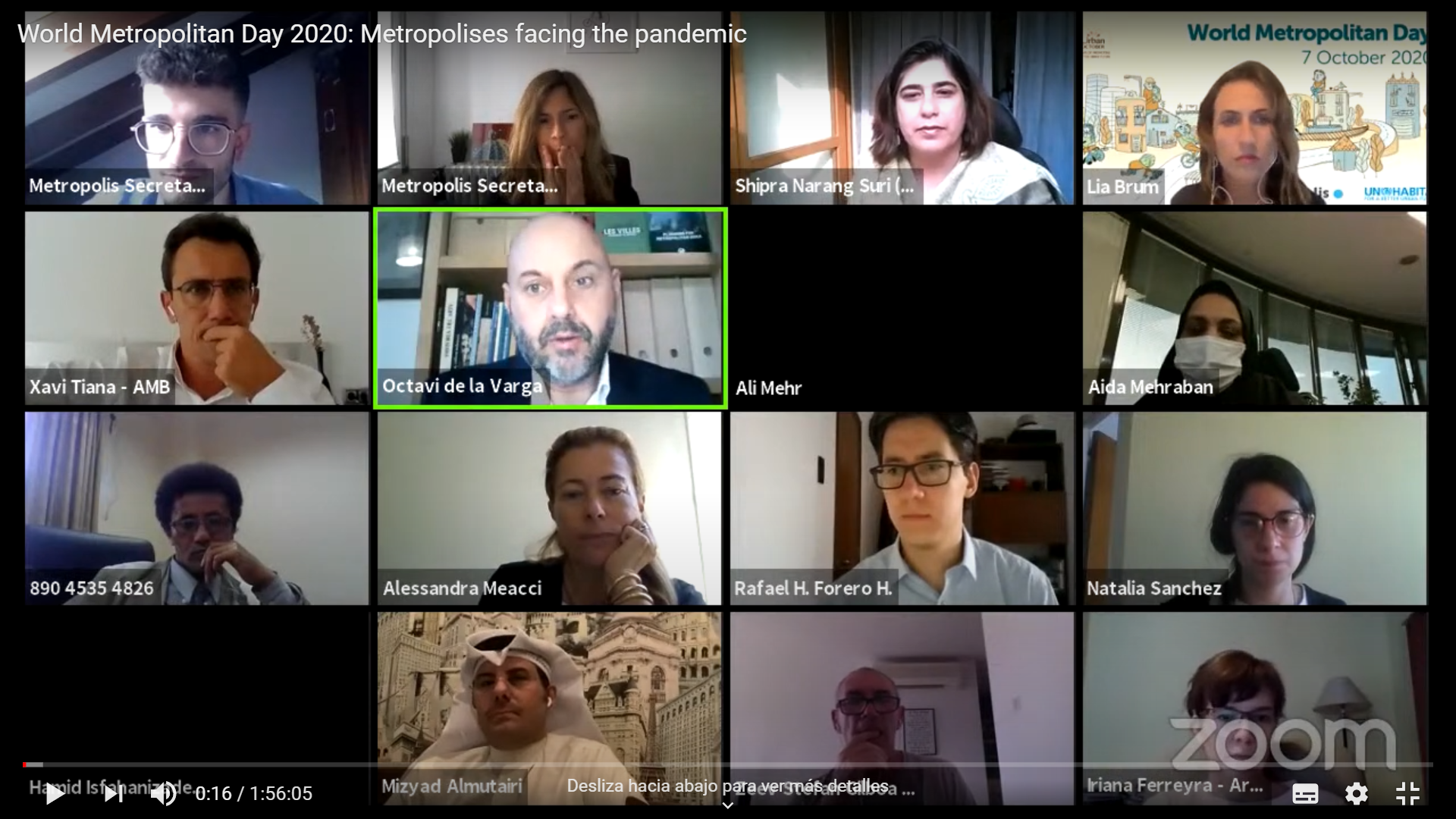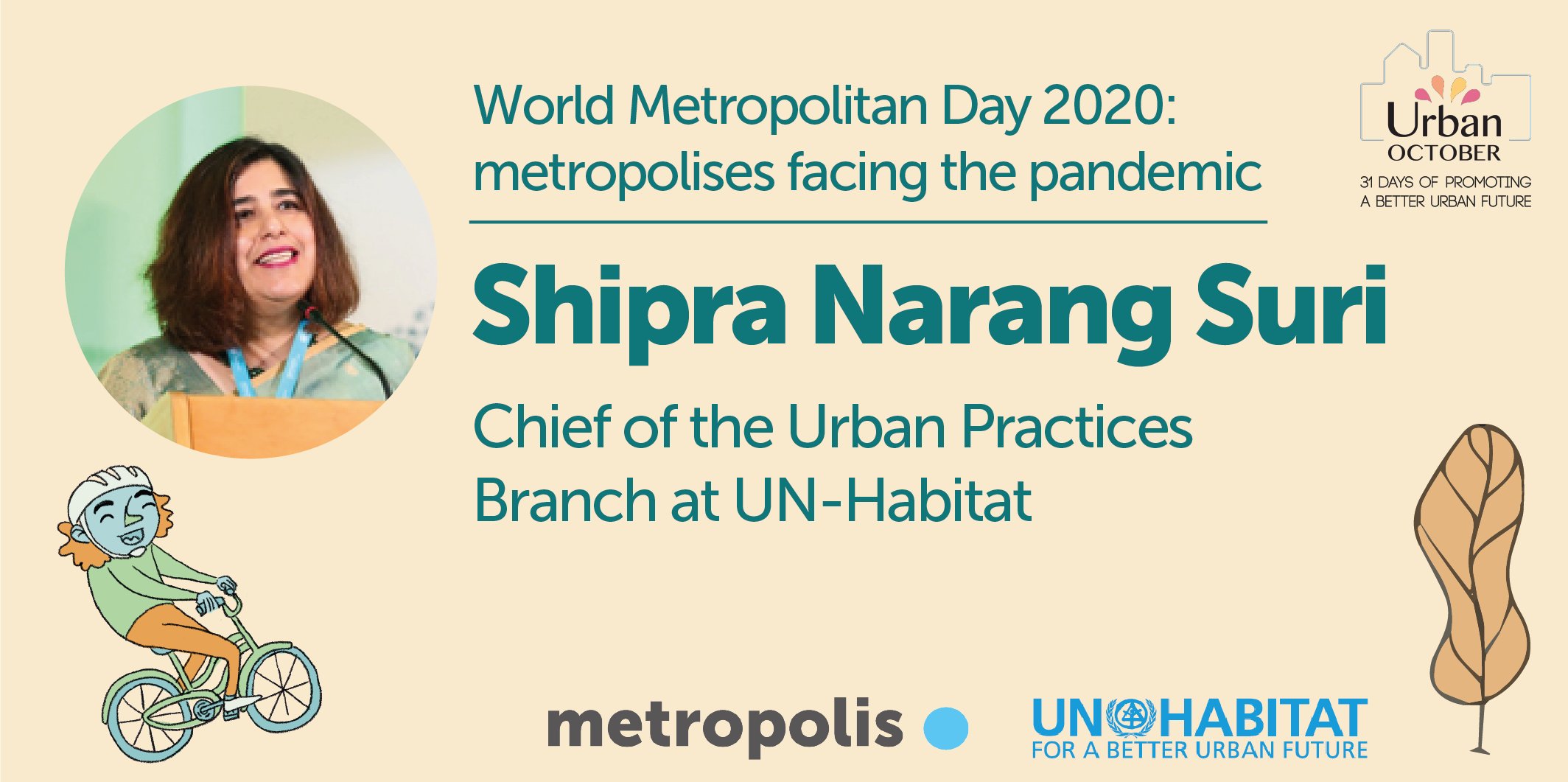
World Metropolitan Day celebrations culminated in a global debate on inequality and citizen participation through the lens of a new form of metropolitan governance
This year the COVID-19 crisis has revealed to the world that metropolitan leadership is crucial to respond to the most pressing global challenges, as cities are precisely where people are suffering the most. For this reason, as part of the World Metropolitan Day celebrations on 7 October, Metropolis and UN-Habitat organised a virtual event titled Metropolises facing the pandemic, under the framework of Urban October.
“This day is a tool for raising awareness, creating open spaces for dialogue between metropolitan actors and stakeholders, identifying solutions, and bringing the phenomenon of metropolisation closer to citizens”, Octavi De la Varga

Our planet is experiencing increasingly complex challenges and dilemmas that cannot be faced without considering the issue of governance and, in particular, metropolitan governance. “This day is a tool for raising awareness, creating open spaces for dialogue between metropolitan actors and stakeholders, identifying solutions, and bringing the phenomenon of metropolisation closer to citizens”, stated Octavi De la Varga, Metropolis Secretary General, at the opening session of the above-mentioned event.
“New approaches and frameworks of governance are fundamental for addressing crises like the COVID-19 pandemic, but they are also required for other crises like rural-urban migration, human rights migration, environmental issues, and more”, declared Rafael H. Forero H., Urban Policy and Metropolitan Expert at UN-Habitat.
“Citizens do not see the metropolitan area as a key source of first-hand information, and this is something that needs to be improved”, Xavier Tiana
In this sense, the first topic addressed during the debate was what we need to improve in terms of metropolitan governance, featuring testimonies from the cities of San Salvador and Barcelona. Yolanda Bichara, Executive Director of the Planning Office of the Metropolitan Area of San Salvador (OPAMSS) asserted: “At this time we are realising that it is not possible to move forward alone. The evolution of the concept of governance has to come with the surname of “collaborative. Co-execution and co-responsibility are elements that must feature in (new) metropolitan governance issues in order to have a greater capacity for advocacy.”
Meanwhile, Xavier Tiana, Head of International Relations for the Barcelona Metropolitan Area (AMB), advocated for a more holistic view of the competences held by metropolitan areas in comparison to other levels of government, where they also have an impact (e.g. culture, health, etc.). He also called for us to “…act as ‘one voice’, a metropolitan response, which, in my opinion, is a question of leadership”, while stating that “citizens do not see the metropolitan area as a key source of first-hand information, and this is something that needs to be improved.”
Undoubtedly, one of the most pressing problems to be solved in our metropolises, from this perspective of new governance, is the very sensitive subject of metropolitan inequality and urban conflict. In the second panel of the event we analysed the metropolis as a space of inequality; in other words, to what extent violence manifests itself in large metropolises as a result of inequality, and the fact that situations of violence have worsened in the context of the pandemic.
“When it comes to rethinking our metropolises, I think it is very important that diagnoses of violence and its causes are carried out at a metropolitan level", Arnau Gutiérrez Camps
“In metropolises, violence manifests itself at different levels and in different ways [...] It is important to note that, in metropolises, the three types of violence—direct, structural and cultural—cannot be separated, and violence is rooted in inequality”, explained Arnau Gutiérrez Camps, Associate Professor of International Relations at the University Carlos III of Madrid. “When it comes to rethinking our metropolises, I think it is very important that diagnoses of violence and its causes are carried out at a metropolitan level; that they implement policies related to citizens, community, proximity; improving relations between governments and citizens”, he pointed out.
From Mexico City Government, Mariana Flores Mayén, Executive Director of Institutional Representation, General Coordination of Advisors and International Affairs, emphasised that “When we talk about vulnerabilities we tend to centralise, but what happens when they converge?[...] We cannot have this sectoral vision when we speak of guaranteeing rights, it has to be a question of a universal nature and, in this sense, public policies must have a human vision.” She went on to highlight that “We need to reinforce trust between government administrations and citizens, creating transparent spaces to address those problems.”
The third panel of the event was dedicated to citizen participation in the construction and development of our metropolises, especially in the context of the current pandemic. The complexity of metropolitan spaces—we are talking about cities with peripheries that are in continuous change, development and growth—makes it difficult to implement citizen participation.
"Citizen participation is a right, and one that cannot be limited because you have a problem with technology”, Borja Prieto
Borja Prieto, Head of Institutional Outreach for Madrid City Council, declared that citizen participation is “a right, and one that cannot be limited because you have a problem with technology.” We need “government administrations to open up and give way to true participation, because citizens know what they need better than the specialists and politicians in the municipality. We must find ways in which the citizens who are willing to work and contribute can open up to institutions. It is no easy task, but it is a long-term effort that we will have to work on”, Prieto remarked.
These arguments were very much in line with those given by Phédia Gottot, Team Leader for Innovation and Experimentation at Ville de Montréal, who illustrated the concept of participation for co-creation: “We see more and more of an evolution from the merely informing citizens to a stance of co-creation with them[...] We are working on creating spaces for the co-creation of the metropolis in the long term, to ensure participation and not just providing information.”

To sum up, “this year, the epidemic has shown us that metropolises are at the front line in the battle for any challenges we face in the 21st century. COVID-19 has deepened social and economic inequality across the world, and new forms of violence have also arisen”, affirmed Shipra Narang Suri, Chief of the Urban Practices Branch at UN-Habitat. “Social rights are fundamental for recovery from COVID-19, and metropolises must offer a space for political engagement and dialogue”, Suri added.
“The metropolitan space must work for all and take care of everyone”, Remy Sietchiping
This event gives us a conclusion that is agreed on by all the participants, as De la Varga pointed out: “Metropolises are a complex reality, and we need real, sound governance that allows metropolitan areas to develop in a healthy and sustainable way”. “The metropolitan space must work for all and take care of everyone”, rounded off Remy Sietchiping, Chief of Policy, Legislation and Governance at UN-Habitat.
This year, more than 27 institutions and local governments joined the World Metropolitan Day celebrations, which sparked 18 initiatives on the metropolisation phenomenon around the world over the last few days, most of them virtual events like the one covered in this article, and counting on the collaboration of more than 30 members of Metropolis. Find more information about all the events here.
More information:
- Did you miss the event? You can watch the full debate by clicking here.
- Further details on the campaign here
- Discover the highlights of #WorldMetropolitanDay2020 on Twitter!

